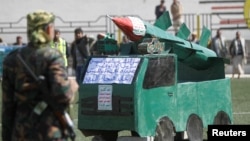An Iranian official says Saudi Arabia should know that if Iranian missiles were used in the Yemen conflict, the outcome of the war would be totally different, as Tehran continues to push back against allegations that it is arming Houthi rebels.
"We have announced repeatedly that the Yemeni army and people have the support of Iran. However, we have also made it clear that we have not given any missiles to Yemenis," said Hossein Naqavi Hosseini, the spokesman for the Iranian Parliament's National Security and Foreign Policy Commission, speaking Sunday.
Houthi rebels of Yemen fired a second ballistic missile into Saudi Arabia last Tuesday. Saudi air defense said the missile was successfully intercepted. Houthi-affiliated al-Masirah TV stated that the ballistic missile targeted the al-Yamamah royal palace in Riyadh, the official headquarters of the Saudi king.
"As your crimes and tyranny increase, you will find nothing but our missiles," Houthi leader Abdulmalik al-Houthi said in a televised speech.
The Yemeni Houthi movement and its allied forces said that these missiles are the only means they have to defend their nation against a Saudi-waged war.
Earlier this month, the U.S. ambassador to the United Nations, Nikki Haley, displayed what she said was residue of the first ballistic missiles that landed near Riyadh's King Khalid International Airport on Nov. 4, 2017.
Speaking in front of a display filled with missile fragments, Haley said that the U.N. found evidence that Iran supplied Houthis with missiles and other arms made by Shahid Bagheri Industrial Group, a firm based in Iran.
Tehran rejected all claims and called the evidence fake.
Who are Houthis?
Yemeni Houthis are armed militants mostly from northern tribes of Sa'dah. They are part of the Zaydis, a sect of the Shia Muslim minority. Houthis control various media outlets throughout the country that trumpet anti-U.S. and anti-Israel rhetoric and attack Arab leaders, calling them puppets of the West.
Former president Ali Abdullah Saleh, who was killed by the Houthis in Sana'a last month, was a Zaydi himself.
"They charged Saleh with massive corruption to steal the wealth of the Arab world's poorest country for his own family," Bruce Riedel, a Washington-based researcher, wrote in his research on Houthis.
Tension between the Houthis and Yemen's central government grew when a political transition failed following an uprising that forced Saleh to hand over power to his deputy Abdrabbuh Mansour Hadi in 2011. This created an unprecedented alliance between Houthis and Saleh against the Saudi-backed Hadi.
"It was a remarkable and a hypocritical reversal of alliances by both the Houthis and Saleh. Much of the army remained loyal to Saleh and his family, so together with the Houthis the two had a preponderance of force in the country. Hadi was deeply unpopular and seen as a Saudi stooge," Riedel said.
Khaled Al-Hammadi, a Yemeni political analyst and journalist, asserts that Iran is arming the Houthis and predicts that "Iran's overwhelming support to these Shi'ite insurgents... will turn Houthis into a force similar to Hezbollah in Lebanon."
Tensions between Iran and Saudi Arabia have escalated during the past months and gone beyond rhetorical attacks to a heated proxy military war.
Saudi Arabia accuses Iran of inciting Houthis against Saudi interests. Riyadh has used its close connection with Washington and Trump's discontent with Iran's nuclear deal, while Tehran accuses Saudi Arabia of leading an inhuman war against defenseless civilians in Yemen.
"Foreign players, who want to fulfill their regional goals or political ambitions, have changed the balance in Yemen and taken a toll on the people of Yemen," Cairo-based Yemeni affairs analyst Maysaa Shojae Al-Deen told VOA.




